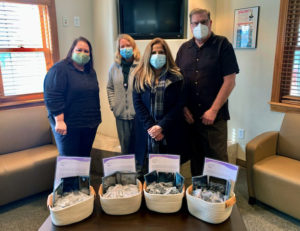 The four white baskets on a table inside the Northern Arizona Healthcare Foundation in Flagstaff carried special gifts: 12 tablets preloaded with relaxation and meditation videos. The tablets with educational videos were donated by the non-profit Sufi Psychology Association (SPA) in appreciation of healthcare workers and their tireless devotion to caring for victims of the COVID-19 pandemic.
The four white baskets on a table inside the Northern Arizona Healthcare Foundation in Flagstaff carried special gifts: 12 tablets preloaded with relaxation and meditation videos. The tablets with educational videos were donated by the non-profit Sufi Psychology Association (SPA) in appreciation of healthcare workers and their tireless devotion to caring for victims of the COVID-19 pandemic.
Recipient facilities were all four of the Northern Arizona Healthcare hospitals, including Flagstaff Medical Center, Verde Valley Medical Center in Cottonwood, Verde Valley Medical Center Sedona Campus and Verde Valley Medical Center Camp Verde Campus.
In addition to the tablets, the donation included 400 disposable headsets. The tablets can be wiped down between users.
Techniques illustrated on the videos are meant to assuage symptoms of burnout suffered by healthcare professionals by helping them manage the impacts of the pandemic, from post-traumatic stress disorder to exhaustion.
Mental health professionals say burnout occurs when stress is prolonged and there seems to be no end in sight and the sufferer is stretched too thin for an uncertain period of time. During the pandemic, there is also profound fear because caregivers, as well as patients and their families, don’t know what they are dealing with as the disease seems to manifest differently.
At the foundation offices on North San Francisco Street, Kimiya Amjadi, M.D., a member of the Sufi Psychology Association, presented the tablets to Richard Smith, president of the NAH Foundation, Cristine Currie, director of NAH Population Health, and Ana Fano, Ed.D., NAH Foundation executive assistant and liaison for the board of directors.
SPA President Saloumeh Bozorgzadeh, Psy.D., is familiar with the fragility of caregivers, who are notorious for putting others first and their own needs last. She operates a wellness center and group practice in Chicago for healthcare workers and medical residents. “I have heard from healthcare workers who say in the break rooms, if they take a break, that everyone is in shock. They just sit and stare off. It’s not a break at all,” she said. “However, if during that time, there is a short, guided practice that is directing you out of your head and out of the experience you are going through and to a more calming, peaceful place, this may give them space to breathe and lift the weight off of their shoulders for a bit.”
Since April, the organization has donated the tablets with stress-relieving applications to more than 225 hospitals in 38 states, where they’ve been placed in wellness rooms, staff lounges, break rooms and chapels.
In the Phoenix area, the organization has donated tablets and videos to all Banner Health, Abrazo, ValleyWise, Honor Health and Dignity Health hospitals, as well as Phoenix Children’s and Phoenix Indian hospitals. FBN
By Betsey Bruner, FBN





